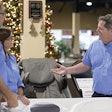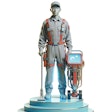Most of us think of our banks as rock-solid repositories for our working capital. And for good reason: Since the federal oversight reforms that followed the Great Depression, these financial institutions have proven themselves worthy trustees of the funds we need to buy supplies, disburse wages and pay the utility bills.
The recent turmoil in the credit markets, though, has cast a new light on the need for prudent cash management. Losses from soured mortgages have eroded the fortunes of financial bulwarks such as Citibank and Bank of America. Hundreds of other institutions are also affected. Any prudent businessperson is bound to wonder: How safe is the bank that holds my money?
The answer to that question, to a large extent, depends on the answer to another: Does the Federal Deposit Insurance Corporation insure the financial vehicle that holds your cash?
Safeguard Your Cash
"The most conservative place for your cash is an FDIC-insured bank account," advises Marilyn J. Holt, a Seattle-based management consultant. "And you never want to put more money into one bank than that bank is insured for under the FDIC."Your first step, then, is to make sure your bank is an FDIC member. The good news is that each such bank is insured up to $100,000, so your funds are safe up to that limit. In the event you have more cash on hand, you will want to deposit the excess at another bank. You aren't covered over $100,000 if you go to another branch of the same bank, cautions Holt.
Step two: Make sure the FDIC also covers the financial vehicle that holds your cash. "Keep in mind that even FDIC-insured banks offer vehicles that are not covered by the FDIC," warns Holt. "So make sure you know the coverage you have."
Checking accounts, the traditional cash vehicle of choice, are most often protected. So are savings accounts and certificates of deposit. Other vehicles may or may not be. While banks are supposed to disclose risk, it's easy for anyone to get confused. It's especially common for mistakes to be made during flush years, such as we have recently experienced, when bank salespeople like to promote higher interest vehicles. Holt suggests reading the fine print and asking questions. "Always ask, 'Is this vehicle FDIC insured?'"
Sounds like the FDIC is your friend, doesn't it? You can find out more about how the agency protects your money at fdic.gov.
Enjoy Higher Returns
Checking and savings accounts are great places to hold cash that you will need in the near future. But how about the money you save for longer-term needs, such as an expansion program, new furniture, computers or a vehicle? It's possible to get that money working a little harder for you. The trick is to select investments that offer both safety and higher interest rates.A good example is a CD. These pay more interest than a checking account in exchange for your commitment to keep your money tied up for certain length of time. Downside: You pay a penalty if you have to get at your funds early.
"You can earn higher interest by investing your working capital in a short-term CD," says Holt. "You can invest in CDs as short as 30 days. If this CD is in an FDIC-insured bank, then your money will be as safe as it is in a checking account. The downside of a CD is that you pay a financial penalty for early withdrawal, so it pays to select maturities that coincide with the time you will need your money. "
Suppose you're planning to buy some expensive new fixtures 12 months from now. You might park the needed funds in a one-year CD. Generally speaking, the longer the term of your CD the higher your interest rate. Once again, just make sure the FDIC covers the CD.
You can enjoy an even higher interest rate with treasury bills, or T-bills. While these are not protected by the FDIC, they receive the full faith and backing of the federal government and are considered safe investments. Like CDs, you receive a greater return on your money by agreeing to keep your funds invested for a given period of time. Again, you pay a penalty if you need to get your money early.
"T-bills and bonds can be good investments when you have defined time frames," says John McQuaig, managing partner of McQuaig & Welk, a Wenatchee, Wash., management consulting firm. "You need to match the maturities to the time frame in which you will need the money. If you have significant funds available for variable time frames, it may make sense to do this."
You can buy T-bills directly from the U.S. Department of the Treasury at treasurydirect.gov.
Avoid Risky Investments
Avoid the temptation to invest funds in higher-risk vehicles that offer larger returns. "In almost every case, a business does not want to focus too much on getting a high return from cash needed to run operations," warns Mary Adams, principal of Trek Consulting, Winchester, Mass. "Unless you are set up to manage money as a business you don't want to invest your working capital in a vehicle that requires ongoing attention or carries risk."One step up on the risk scale is the money market mutual fund. Be aware of how this vehicle differs from its sound-alike cousin, the money market account. "Money market accounts at your banks have FDIC insurance so they are well protected," says McQuaig. "Money market funds sponsored by brokerage houses, on the other hand, are not insured by the FDIC." While such funds incur less risk than some other investments because they stay in the relatively stable market for short-term bonds and treasury notes, they do incur more risk than FDIC-insured bank accounts.
Do the high returns available in the stock market attract you? Maybe so, but advisors say to stay away when it comes to your critical funds. "You never would want to get in and out of stocks in a period of one or two years, let alone months," says Adams. "That is speculation."
And even more risky are more exotic vehicles such as gold funds and municipal bonds. "I have seen people lose their businesses because they have had excess funds parked in what seemed to be safe investments that did not turn out that way," says McQuaig. "Bond funds may sound safe but their value changes with changing interest rates. If interest rates go up the value of bond funds go down. So you are still subject to volatility."
Match Investments With Needs
Prudent cash management largely means determining your financial requirements over certain time frames, then selecting safe vehicles that give you the best return until it's time to access your funds."Ask yourself when you will need your money," suggests Holt. "Look for seasonal patterns. Go through your banking accounts and orders and see if you can spot any trends. Are revenues going up or down? And what is the actual cost to keep your doors open? Make sure you can cover that."
Finally, says Holt, consider how the larger economic environment might bear on your sales in the year ahead. "In bad times your business can be adversely affected. You need to ask, 'How will inflation, changes in home construction and other issues affect the sales of my products and services?' Is your market expanding or contacting and how do you want to respond?"
The most important thing is to make sure your cash is secure until you need it, adds McQuaig. "Safety has to be your No. 1 concern. Because interest rates are not very high today, a vehicle with a higher return will not make a significant difference anyhow. So there's no point in taking risk."
Securing a steady flow of working capital can pay off in another way: A record of prudent financial management may well inspire your banker to give you the red carpet treatment when you need money to fund new business opportunities. "Banks today monitor your collected balances," notes McQuaig. "When you want to borrow money they will take all your balances into account, making you eligible for a lower interest rate on your loan. That can be quite an advantage."
Take care of your cash, and your cash will take care of you.






































